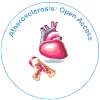Unsere Gruppe organisiert über 3000 globale Konferenzreihen Jährliche Veranstaltungen in den USA, Europa und anderen Ländern. Asien mit Unterstützung von 1000 weiteren wissenschaftlichen Gesellschaften und veröffentlicht über 700 Open Access Zeitschriften, die über 50.000 bedeutende Persönlichkeiten und renommierte Wissenschaftler als Redaktionsmitglieder enthalten.
Open-Access-Zeitschriften gewinnen mehr Leser und Zitierungen
700 Zeitschriften und 15.000.000 Leser Jede Zeitschrift erhält mehr als 25.000 Leser
Indiziert in
- Google Scholar
- RefSeek
- Hamdard-Universität
- EBSCO AZ
- Publons
- ICMJE
Nützliche Links
Open-Access-Zeitschriften
Teile diese Seite
Abstrakt
Myocardial Infarction: Understanding the Heart Attack
Helen Jhao
Myocardial infarction, commonly known as a heart attack, is a life-threatening medical condition that results from
the blockage of blood flow to the heart muscle. This article provides a comprehensive overview of myocardial infarction,
encompassing its causes, risk factors, symptoms, diagnosis, treatment, and prevention. The primary cause of heart
attacks is atherosclerosis, characterized by the accumulation of plaque in the coronary arteries, which can lead to
the formation of blood clots and subsequent obstruction of blood flow. Numerous risk factors, including age, gender,
family history, smoking, hypertension, high cholesterol, diabetes, obesity, and stress, contribute to the likelihood of
experiencing a heart attack. Recognizing the symptoms of a heart attack, which may vary from person to person, is
crucial for prompt intervention and improved outcomes. Diagnostic methods, such as electrocardiograms, blood tests,
coronary angiography, echocardiography, and stress testing, aid in confirming the diagnosis. Immediate treatment
options include medications, thrombolytic therapy, angioplasty with stenting, and coronary artery bypass grafting,
depending on the severity of the condition. Preventing myocardial infarction involves adopting a heart-healthy lifestyle,
including a balanced diet, regular exercise, smoking cessation, stress management, blood pressure and cholesterol
control, and proper diabetes management. This article underscores the importance of timely intervention and a
proactive approach to heart health, emphasizing the potential for improving long-term outcomes and reducing the risk
of myocardial infarction. Consultation with healthcare professionals is encouraged for individualized guidance and care.
Zeitschriften nach Themen
- Allgemeine Wissenschaft
- Biochemie
- Chemie
- Genetik und Molekularbiologie
- Geologie und Geowissenschaften
- Immunologie und Mikrobiologie
- Klinische Wissenschaften
- Krankenpflege und Gesundheitsfürsorge
- Landwirtschaft und Aquakultur
- Lebensmittel & Ernährung
- Maschinenbau
- Materialwissenschaften
- Medizinische Wissenschaften
- Pharmazeutische Wissenschaften
- Physik
- Sozial- und Politikwissenschaften
- Umweltwissenschaften
- Veterinärwissenschaften
Klinische und medizinische Fachzeitschriften
- Anästhesiologie
- Augenheilkunde
- Betrieb
- Dermatologie
- Diabetes und Endokrinologie
- Gastroenterologie
- Genetik
- Gesundheitspflege
- Immunologie
- Infektionskrankheiten
- Kardiologie
- Klinische Forschung
- Medizin
- Mikrobiologie
- Molekularbiologie
- Neurologie
- Onkologie
- Pädiatrie
- Pathologie
- Pflege
- Toxikologie
- Zahnheilkunde

 English
English  Spanish
Spanish  Chinese
Chinese  Russian
Russian  French
French  Japanese
Japanese  Portuguese
Portuguese  Hindi
Hindi